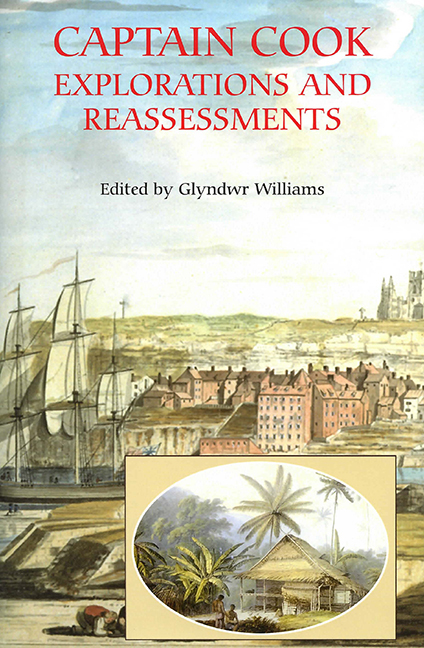Book contents
- Frontmatter
- Contents
- List of illustrations
- Contributors
- Acknowledgements
- Abbreviations
- Introduction
- Part I The Years in England
- Part II The Pacific Voyages
- 4 ‘Notwithstanding our signs to the contrary’: textuality and authority at the Endeavour River, June to August 1771
- 5 Tute: the impact of Polynesia on Captain Cook
- 6 Some thoughts on Native Hawaiian attitudes towards Captain Cook
- 7 Captain Cook's command of knowledge and space: chronicles from Nootka Sound
- Part III Captain Cook and his Contemporaries
- Part IV The Legacy of Captain Cook
- Index
7 - Captain Cook's command of knowledge and space: chronicles from Nootka Sound
from Part II - The Pacific Voyages
Published online by Cambridge University Press: 25 October 2017
- Frontmatter
- Contents
- List of illustrations
- Contributors
- Acknowledgements
- Abbreviations
- Introduction
- Part I The Years in England
- Part II The Pacific Voyages
- 4 ‘Notwithstanding our signs to the contrary’: textuality and authority at the Endeavour River, June to August 1771
- 5 Tute: the impact of Polynesia on Captain Cook
- 6 Some thoughts on Native Hawaiian attitudes towards Captain Cook
- 7 Captain Cook's command of knowledge and space: chronicles from Nootka Sound
- Part III Captain Cook and his Contemporaries
- Part IV The Legacy of Captain Cook
- Index
Summary
Introduction
In an elliptical line in the preface to his edition of Cook's journal of his third voyage, J.C. Beaglehole writes: ‘Where Cook went, why he said what he did, the accidents of the weather: all this may be taken as matter of historical geography.’ Beaglehole was interested in the geographical circumstances in which Cook worked, and had a great feel for how Cook's writing was influenced by his personality and the diverse pressures placed upon him as a naval commander. Yet in important respects, matters of historical geography, at least as they are construed in the recent critical literature on European exploration, are quite incidental to his portrayal of Cook. Beaglehole whittles down the range of ways in which it is possible to think about Cook's voyages geographically to an underlying, and almost unrelenting, spatial project. Cook is represented as ‘a great dispeller of [geographical] illusion’, and as a judicious and disinterested observer who was a ‘genius of the matter of fact’ and had ‘a perfectly unassuming and primary wish to tell the truth’. In Beaglehole's mind, Cook painstakingly pursued what one of his midshipmen on the third voyage, George Vancouver, subsequently described as the ‘ardour of the present age, to discover and delineate the true geography of the earth’. Beaglehole also saw Cook as an increasingly confident and adept journalist, who, by his third voyage (when he was happy to sail without a civilian naturalist), had gained a firm command over the knowledge that his voyages yielded and how it was to be publicly disseminated by the Admiralty. The agendas and chronicles of Cook's supernumeraries, officers and Admiralty editors, which had an important influence on public perceptions of Cook's voyages, are not ignored by Beaglehole so much as placed in a subordinate position to Cook's ‘official’ voice.
In these ways and more, Beaglehole referred questions of knowledge and space – of how the Pacific was represented and encountered – back to Cook, and reinforced the late eighteenth-century image of him as ‘the most moderate, humane and gentle circumnavigator who ever went upon discoveries’, as Fanny Burney famously described him. Overall, Cook emerges from Beaglehole's immense scholarship as a champion of the European Enlightenment, and particularly its ideals of empirical observation and peaceful contact, which were enshrined in Cook's instructions from the Admiralty.
- Type
- Chapter
- Information
- Captain CookExplorations and Reassessments, pp. 110 - 134Publisher: Boydell & BrewerPrint publication year: 2004

